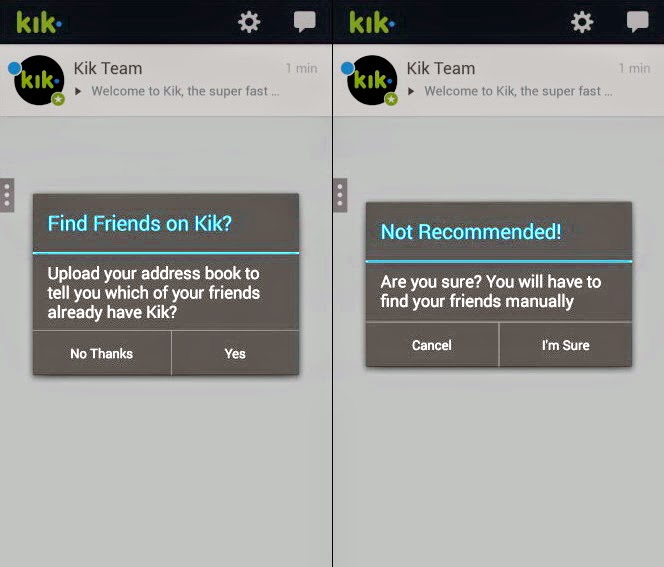It’s no secret that I enjoy flirting. Doesn’t matter if it’s with a friend I’ve known going back to elementary school, or a sexy blogger in whose presence I’ve never actually stood. Doesn’t matter if we’re standing face-to-face at a social event, or separated by thousands of miles and communicating online. I’m always up for some sexy talk. If it’s online and pictures are exchanged, so much the better; while I consider myself more cerebral than the average guy I still appreciate a visual. That’s why Skype is such an amazing thing, and for me a highly valued semi-regular avenue for flirting.
I tend to flirt via Twitter and Kik more often than any other means, though I have been known to flirt via text and email, as well as Yahoo! Messenger, Google Hangouts, WhatsApp, and Snapchat on occasion. Snapchat less than the others, though, as it can be hard to masturbate to a suggestive photo that disappears ten seconds after it is received. Still, I’m not the kind of guy who can have too many options for staying in touch with the women I desire, and I’m always on the lookout for new messaging apps.
I’m guessing that it was with this knowledge in mind that our friend Curvaceous Dee recently suggested that I download Viber, a messaging and VOIP app available on a number of platforms including Android, which would allow me to use it on my phone. I was intrigued, and told her I’d check it out. Unfortunately, there’s no way I’m going to install and use it.
At first glance, Viber appears to be an incredibly functional app, allowing users to not only send and receive text messages but also exchange photos, video and audio, and also send and receive calls. I can get on board for something like that; while I prefer to use Kik, there are undoubtedly many women with whom I’d like to converse regularly who use Viber instead. Limiting myself to just a few messaging apps might be preventing me from being the most productive horny stay-at-home parent that I can be.
Before downloading Viber, and in fact before checking any reviews online, I sent out a tweet asking if any of my followers had any experience with the app. It was originally released in December 2010, and it stood to reason that someone had used it and could address my concerns, notably whether there were any privacy issues of the sort that might prove prohibitive for an individual using it under an assumed name, such as myself.
Persistent, aren’t they?
After installing Kik, for example, its users are prompted during the setup phase to allow the app to search their phone for Kik users amongst their contacts. And while that’s perhaps not as creepy and Big Brotherish as the app sending a notification to people in my contacts who are using it, I still dislike it when a messaging app that I’m using with an alternate identity attempts to access my phone contacts.
In theory, even if I opt out Kik may still tell a friend who signs up in the future that I am using the app, provided the friend gives the app its allowance to check his or her contacts for Kik users. However, Kik will not identify me by my phone number, only by my username which does not in any way correspond with my real name. Thus, presumably it cannot be traced back to me. I have never received a Kik message from anyone from my phone contacts, i.e. someone who I didn’t know from blogging or Twitter (hereafter referred to as “offline friends”).
My WhatsApp account uses my real name, if only because more of my offline friends use it. I couldn’t very well call myself jackandjillcpl or a similar pseudonym in the interest of keeping my identity secret from the handful of Twitter friends with whom I communicate using WhatsApp as that would expose my Twitter and blogging identity to the significantly higher number of offline friends. I can only imagine the flood of questions I’d receive – likely in the form of public Facebook posts – from offline friends who are curious about the significance of my WhatsApp handle, and that’s if they don’t manage to use it to track down my Twitter account or our blog. At any rate, in order to add someone to your WhatsApp contacts they must already be in your phone contacts, or you must be willing to add them.
My inquiry about Viber didn’t get much response on Twitter – save one reply from ImaGodiva that validated my concern that the app identifies the user by his or her mobile phone number rather than a semi-anonymous username – so I started looking at reviews. I didn’t get very far, however; the first one I read featured the following passage which more or less ruled out my ever using it:
“The app automatically searches your contact list for people, who are already using Viber and lists them so you can easily find them.”
To me that sounded like a major red flag, especially in light of ImaGodiva’s warning, and it had the unfortunate side effect of turning me off of the app forever. An interview with Viber’s founder Talmon Marco stresses his privacy concerns, though that seems to be limited to long-term retention of messages and conversations as well as government eavesdropping, and not necessarily to user anonymity.
If I am using an app under a pseudonym, I don’t need said app notifying my offline friends of my usage, whether it’s a high school friend, my father-in-law, or a random business client. At the absolute best, it might lead to an awkward conversation with the offline friend. At worst, it might lead the offline friend to discover Jill’s and my alter-egos (or if you prefer, our secret identities). The middle ground, one of these individuals realizing that my phone number is connected to a username such as “NorCalBBWfucker”, “Peggingfan76”, or “FurryFreak90210″*, would bode poorly as well.
Still beats having to memorize pager code.
For now I think I’ll stick to Kik, Twitter, and all the other media I mentioned in the second paragraph. What about all of you? Do I have it wrong? Am I overestimating the threat to my own privacy posed by Viber? Or am I underestimating the threat posed by Kik, et al.? Let me know.
– Jack
*Not that I use any of these usernames.



I totally don’t blame you. I wouldn’t use it for that reason either. Hell, Twitter linked my phonebook once without my knowledge and a coworker started following my naughty Twitter. Thankfully their Twitter was naughty too. We talked about it once, never bringing up our secret again. I changed my settings as soon as that happened though.
Doesn’t the exact same concerns apply to WhatsApp? I just use my (fairly common) real first name there, which allows me to use it with both online and offline friends.
Perhaps, but as stated in the post, I use my real name on WhatsApp, which prevents any problems with offline friends finding out about our dual identities. The only online friends who are aware of the account are ones I absolutely trust, i.e. ones I’ve met. This is different than, say, logging into an app with a fake name and then having it notify your phone contacts.
They’re definitely valid reasons for not going with it 🙂
xx Dee